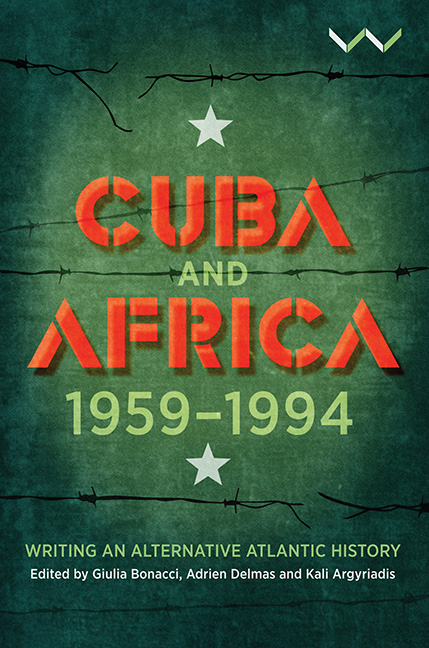Book contents
- Frontmatter
- Contents
- Figures and Table
- Foreword
- Acknowledgements
- Acronyms and Abbreviations
- Timeline of Historical Events
- Map of Africa, 1994
- Introduction Reconfiguring the Cuba–Africa Encounter
- Part I Politics and Solidarity
- Part II Trajectories
- Part III Voices
- Part IV Reconstructing History, Reconnecting Roots
- Contributors
- Index
Chapter 10 - The Island, the Peninsula, and the Continent: Cuban American engagements with Africa
Published online by Cambridge University Press: 15 June 2021
- Frontmatter
- Contents
- Figures and Table
- Foreword
- Acknowledgements
- Acronyms and Abbreviations
- Timeline of Historical Events
- Map of Africa, 1994
- Introduction Reconfiguring the Cuba–Africa Encounter
- Part I Politics and Solidarity
- Part II Trajectories
- Part III Voices
- Part IV Reconstructing History, Reconnecting Roots
- Contributors
- Index
Summary
In 1978, the Nigerian religious leader Ifá Yemí Elebuibon visited Miami for 42 days, having been invited by a Cuban American babalao (a priest in the Ifá religious tradition). Three years before, that Cuban American priest, José Miguel Gómez Barberas, had travelled to Elebuibon's Yoruba home town to obtain an Olofin, a precious ritual object that allowed him to legitimately initiate new babalaos and create his own ritual lineage. Gómez brought Elebuibon to Miami to make new Olofins for other Cuban American babalaos, and he would soon take three other Miami Cubans to Nigeria to be initiated. These transatlantic crossings were part of Gómez's efforts to break the dependency of Miami babalaos upon the Olofins produced by a powerful Havana-based babalao. To Gómez and other Miami Cubans, bypassing Cuba and going to Yorubaland enabled them to create an authoritative new line of religious descent and gave validity to their religious practices, imagined as authentically African.
The same year in which Ifá Yemí visited Miami, other Cuban Americans were crossing the ocean to develop another sort of relationship with Africa. Nearly three hundred Cuban exiles, most of them veterans of the Bay of Pigs invasion, spent eight months of 1978 in war-torn Angola fighting the leftist government of the Popular Movement for the Liberation of Angola (MPLA) alongside local anti-communist guerrillas. This was a response to the heavy and growing military support of the MPLA by Cuba's socialist regime, and it gave the exiles the opportunity to engage directly with Cuban troops across the Atlantic. For several reasons this mission did not last long and Cuban Americans failed to be a major player in the Angolan war, but their endeavour indicates that Cuban exiles were then interested in Angola as a transatlantic space where they could confront the Cuban government and react to its widespread support for African leftist movements.
One can only wonder what kind of relationship, if any, the Miami-based Cubans who met Ifá Yemí Elebuibon had with the Cuban Americans who fought in Angola. Yet, these snapshots from 1978 are quite revealing of broader and longer-lasting phenomena. In one case, Miami Cubans travelled to Angola as a way of opposing Cuban political leaders. In the other, a Nigerian priest travelled to Florida to help Miami Cubans break their dependency on a Cuban religious leader.
- Type
- Chapter
- Information
- Cuba and Africa, 1959-1994Writing an Alternative Atlantic History, pp. 233 - 260Publisher: Wits University PressPrint publication year: 2020



